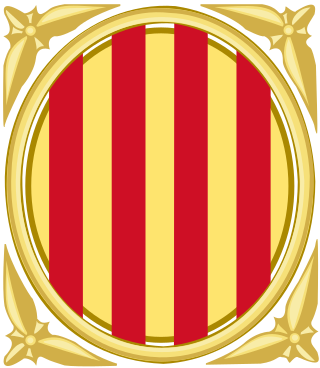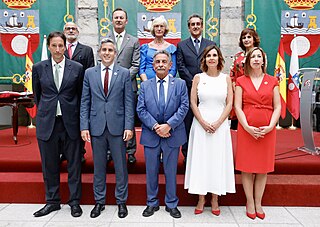
Josep Bargalló i Valls is a Spanish teacher and politician from Catalonia and the current Minister of Education of Catalonia.

The Executive Council of Catalonia or the Executive Government of Catalonia is the executive branch of the Generalitat of Catalonia and its main collective decision-making body. It is responsible for the political action, regulation, and administration of the government of the autonomous region.

The fourth government of Jordi Pujol was formed on 16 April 1992 following the latter's reelection as President of Catalonia by the Parliament of Catalonia on 9 April and his swearing-in on 15 April, as a result of the Convergence and Union (CiU) alliance emerging as the largest parliamentary force at the 1992 Catalan regional election and securing a third consecutive absolute majority. It succeeded the third Pujol government and was the Government of Catalonia from 16 April 1992 to 11 January 1996, a total of 1,365 days, or 3 years, 8 months and 26 days.

The 2003 Catalan regional election was held on Sunday, 16 November 2003, to elect the 7th Parliament of the autonomous community of Catalonia. All 135 seats in the Parliament were up for election.

The president of the Valencian Government is the head of the Generalitat Valenciana, the government of the Spanish autonomous community of Valencia. The president is chosen by the Valencian parliament, the Corts Valencianes.

The Puigdemont Government was the regional government of Catalonia led by President Carles Puigdemont between 2016 and 2017. It was formed in January 2016 after the resignation of Puigdemont's predecessor Artur Mas and it ended in October 2017 with the imposition of direct rule following the Catalan declaration of independence.

The government of Ángel Garrido was formed on 22 May 2018, following the latter's election as President of the Community of Madrid by the Assembly of Madrid on 18 May and his swearing-in on 21 May, as a result of the resignation of the former president, Cristina Cifuentes, over a string of scandals involving the fraudulent obtention of a master's degree, the subsequent document forgery to cover it up and the leaking of a 2011 shoplifting video in which she was involved. It succeeded the Cifuentes government and was the Government of the Community of Madrid from 22 May 2018 to 20 August 2019, a total of 455 days, or 1 year, 3 months and 2 days.

Ernest Maragall i Mira is a Spanish economist, politician, member of the Parliament of Catalonia and former Minister of Foreign Action, Institutional Relations and Transparency of Catalonia. He was previously Minister of Education, a member of the European Parliament and a member of Barcelona City Council (BCC).

The first government of Ximo Puig was formed on 30 June 2015, following the latter's election as President of the Valencian Government by the Corts Valencianes on 25 June and his swearing-in on 28 June, as a result of the Socialist Party of the Valencian Country (PSPV–PSOE) and Commitment Coalition (Compromís) being able to muster a majority of seats in the Parliament with external support from We Can (Podemos) following the 2015 Valencian regional election. It succeeded the Fabra government and was the Valencian Government from 30 June 2015 to 17 June 2019, a total of 1,448 days, or 3 years, 11 months and 18 days.

The second government of Ximo Puig was formed on 17 June 2019, following the latter's election as President of the Valencian Government by the Corts Valencianes on 13 June and his swearing-in on 15 June, as a result of the Socialist Party of the Valencian Country (PSPV–PSOE) emerging as the largest parliamentary force at the 2019 regional election. It succeeded the first Puig government and was the Valencian Government from 17 June 2019 to 19 July 2023, a total of 1,493 days, or 4 years, 1 month and 2 days.

The second government of Miguel Ángel Revilla was the regional government of Cantabria during the 10th legislature (2019–2023).

The second government of Fernando López Miras was formed on 1 August 2019, following the latter's election as President of the Region of Murcia by the Regional Assembly of Murcia on 26 July and his swearing-in on 29 July, as a result of the People's Party (PP) allying itself with Citizens (Cs) and mustering the external support from Vox in exchange for policy compromises following the 2019 Murcian regional election. It succeeded the first López Miras government and has been the incumbent government of the Region of Murcia since 1 August 2019, a total of 1,884 days, or 5 years, 1 month and 26 days.

The first government of Isabel Díaz Ayuso was formed on 20 August 2019, following the latter's election as President of the Community of Madrid by the Assembly of Madrid on 14 August and her swearing-in on 19 August, as a result of the People's Party (PP) and Citizens (Cs) being able to muster a majority of seats in the Assembly with external support from Vox following the 2019 Madrilenian regional election. It succeeded the Garrido government and was the Government of the Community of Madrid from 20 August 2019 to 21 June 2021, a total of 671 days, or 1 year, 10 months and 1 day.

The government of Pere Aragonès was formed on 26 May 2021 following the latter's election as President of the Government of Catalonia by the Parliament of Catalonia on 21 May and his swearing-in on 24 May, as a result of Republican Left of Catalonia (ERC) and Together for Catalonia (Junts) being able to muster a majority of seats in the Parliament with external support from the Popular Unity Candidacy (CUP) following the 2021 Catalan regional election. It succeeded the Torra government and was the Government of Catalonia from 26 May 2021 to 12 August 2024, a total of 1,174 days, or 3 years, 2 months and 17 days.

The government of Carlos Mazón was formed on 19 July 2023, following the latter's election as President of the Valencian Government by the Corts Valencianes on 13 July and his swearing-in on 17 July, as a result of the People's Party (PP) emerging as the largest parliamentary force at the 2023 regional election. It succeeded the first Puig government and is the incumbent Valencian Government since 19 July 2023.

The government of Salvador Illa was formed on 12 August 2024 following the latter's election as President of the Government of Catalonia by the Parliament of Catalonia on 8 August and his swearing-in on 10 August, as a result of the Socialists' Party of Catalonia (PSC) being able to muster a majority of seats in the Parliament with external support from the Republican Left of Catalonia (ERC) and Commons Unite following the 2024 Catalan regional election. It succeeded the Aragonès government and has been the incumbent Government of Catalonia since 12 August 2024, a total of 46 days.
















